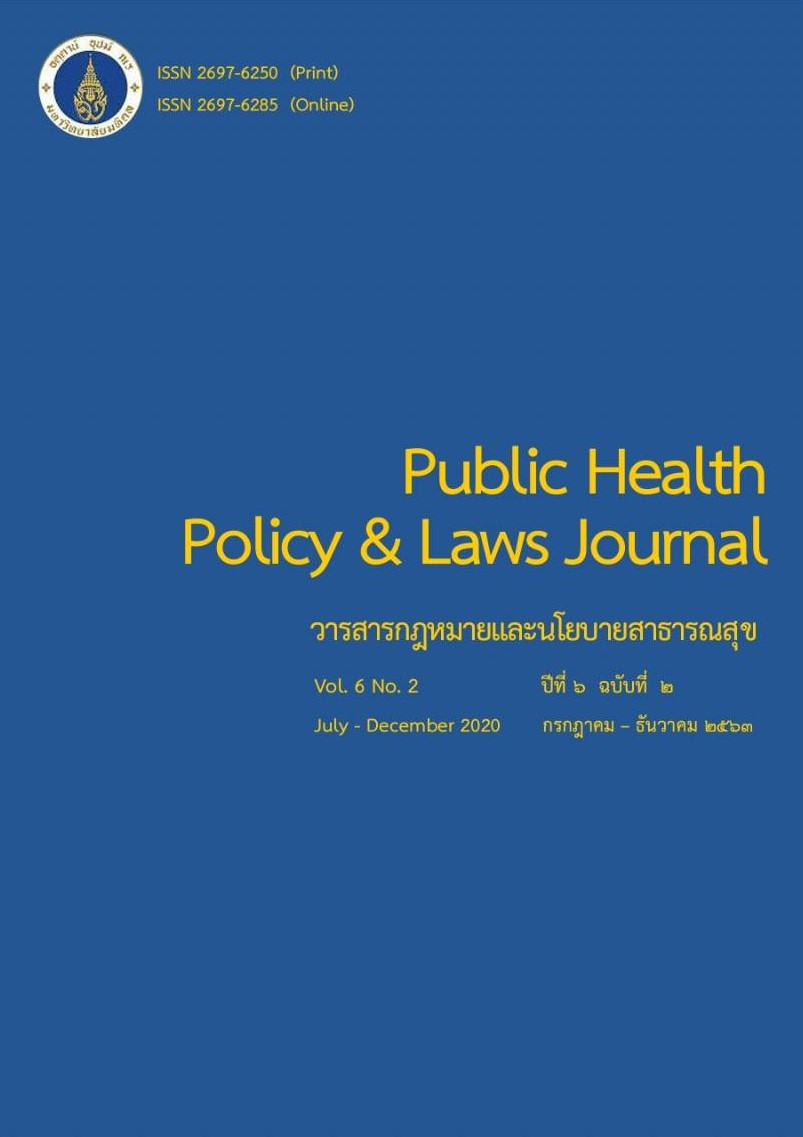ความยินยอมของบุคคลเปราะบาง: ศึกษากรณีการเข้าร่วมวิจัยในมนุษย์
คำสำคัญ:
บุคคลเปราะบาง, การวิจัยในมนุษย์, ความยินยอมในกฎหมายอาญาบทคัดย่อ
บทความนี้มีวัตถุประสงค์เพื่อศึกษาหลักเกณฑ์ในการให้ความยินยอมที่ได้รับการบอกกล่าวของบุคคลเปราะบางในการเข้าร่วมการวิจัยในมนุษย์ โดยได้ทำการศึกษาเปรียบเทียบแนวคิดและที่มาของกฎหมายที่ใช้ในการควบคุมการทำวิจัยในมนุษย์ซึ่งเป็นบุคคลเปราะบางทั้งตามกฎหมายประเทศไทยและกฎหมายต่างประเทศ เพื่อที่จะวิเคราะห์แนวคิดในการคุ้มครองบุคคลเปราะบางผู้เข้าร่วมการวิจัยในมนุษย์และหลักเกณฑ์ที่เกี่ยวข้องในการให้ความยินยอมของบุคคลเปราะบางในเข้าร่วมการวิจัยในมนุษย์ เพื่อนำเสนอแนวทางในการแก้ไขปรับปรุงบทบัญญัติแห่งกฎหมายที่เกี่ยวข้องกับการวิจัยในมนุษย์ของประเทศไทยให้เกิดความครอบคลุมและสามารถกำกับดูแลการทำวิจัยในมนุษย์ซึ่งเป็นบุคคลเปราะบางได้อย่างมีประสิทธิภาพ
ผลจากการศึกษาพบว่าบทบัญญัติที่เกี่ยวข้องกับการวิจัยในมนุษย์ในประเทศไทยนั้นไม่เพียงพอต่อการคุ้มครองบุคคลเปราะบาง เนื่องจากการวิจัยในมนุษย์นั้นเป็นการกระทำต่อร่างกายของผู้เข้าร่วมในการวิจัย ดังนั้นหลักเกณฑ์ที่ไม่เพียงพอดังกล่าวจึงอาจทำให้ผู้ทำวิจัยในมนุษย์มีความรับผิดทางอาญาว่าด้วยชีวิตหรือร่างกายของผู้เข้าร่วมในการวิจัยได้ นอกจากนี้บุคคลเปราะบางซึ่งเป็นบุคคลที่มีความบกพร่องในด้านความสามารถในการตัดสินใจหรือสามารถตัดสินใจได้แต่การตัดสินใจนั้นไม่ได้เป็นไปโดยอิสระจึงเป็นบุคคลที่ถูกชักจูงโน้มน้าว หลอกลวง บังคับข่มขู่ให้แสดงความยินยอมในการเข้าร่วมการวิจัยได้โดยง่าย ดังนั้นการขาดหลักเกณฑ์ดังกล่าวจึงอาจทำให้ไม่สามารถคุ้มครองสิทธิและเสรีภาพในการตัดสินใจของบุคคลเปราะบางให้เป็นไปโดยอิสระได้ งานวิจัยนี้จึงมีข้อเสนอว่าควรมีการบัญญัติหลักเกณฑ์เรื่อง ความสามารถในการให้ความยินยอมของบุคคลเปราะบาง บุคคลที่มีอำนาจในการให้ความยินยอมแทนบุคคลเปราะบาง รวมถึงข้อยกเว้นในการขอความยินยอมดังกล่าวไว้อย่างชัดแจ้งในกฎหมาย
เอกสารอ้างอิง
จิตติ ติงศภัทิย์. (2515). คำอธิบายประมวลกฎหมายอาญา ภาค1 ตอน2. กรุงเทพมหานคร: แสงทองการพิมพ์.
วิฑูรย์ ตรีสุนทรรัตน์. (2561). กฎหมายการแพทย์ ความยินยอมภายหลังได้รับการบอกกล่าวแล้ว (Informed Consent). กรุงเทพมหานคร: สำนักพิมพ์นิติธรรม.
วิฑูรย์ อึ้งประพันธ์. (2548). การวิจัยทางการแพทย์. ใน การสัมมนาเรื่องปัญหากฎหมายและชีวจริยศาสตร์ในการวิจัยทางการแพทย์. จัดโดย ศูนย์กฎหมายสุขภาพและจริยศาสตร์ โดยความร่วมมือระหว่างคณะนิติศาสตร์ มหาวิทยาลัยธรรมศาสตร์ และสถาบันวิจัยระบบสาธารณสุข กรุงเทพมหานคร.
จิตติ ติงศภัทิย์. (2520). ความยินยอมไม่ทำให้เป็นความผิด. วารสารกฎหมาย. ปีที่3. ฉบับที่2.
สัญญา สุขพณิชนันท์. (2551). เหตุการณ์ที่นำไปสู่หลักการของจริยธรรมการวิจัยในคน. เวชบันทึกศิริราช. ฉบับที่ 2. ปีที่ 1.
อำนาจ บุบผามาศ. (2555). ความยินยอมที่ได้รับการบอกกล่าวในการวิจัยในมนุษย์. วิทยานิพนธ์ดุษฎีบัณฑิต คณะนิติศาสตร์ มหาวิทยาลัยธรรมศาสตร์.
Andrew Hocking. (2002). The Law of Consent to medical treatment. London: Sweet and Maxwell.
Appelbaum, et al. (1987). Informed Consent: Legal Theory and Clinical Practice. New York: Oxford University Press.
Bruce D. Sales and Susan Folkman. (2005). Ethics in Research with Human Participants. Washington, D.C.: American Psychological Association.
CIOMS. (2016). International Ethical Guidelines for health-related Research Involving Humans. 4th edition. Geneva: Council for International Organizations of Medical Sciences.
D. Solter, et al. (2003). Embryo Research in Pluralistic Europe. New York: Springer-Verlag.
Henk Ten Have. (2016). Vulnerability: Challenging Bioethics. New York: Routledge.
Phil Bielby. (2008). Competence and vulnerability in biomedical research. Berlin: Springer.
Ruth R. Faden and Tom L. Beauchamp. (1986). A History and Theory of Informed Consent. New York: Oxford University Press.
Tom L. Beauchamp and James F. Childress. (2009). Principle of Biomedical Ethic. 6th Edition New York: Oxford University Press.
Bereket Damtew. (2018). Justice in Research: History, Principle and Application (A Literature
Review. in Conference Ethics in Conducting Health Systems Research. At Haramaya University. School of Graduate Studies.
Ada C. Rogers, (1997). Vulnerability, health and health care. Journal of Advanced Nursing. Vol26. Issue1.
Dearbhail Bracken-Roche, et al. (2017). The Concept of ‘Vulnerability’ in Research Ethics: an In-Depth Analysis of Policies and Guidelines. Health Research Policy and Systems. Vol15. Issue 8.
Erwin Deutsch. (1999). The Protection of the Person in Medical Research in Germany. Medicine and Law. Vol.18. Issue 1.
ดาวน์โหลด
เผยแพร่แล้ว
รูปแบบการอ้างอิง
ฉบับ
ประเภทบทความ
สัญญาอนุญาต
Disclaimer and Copyright Notice
เนื้อหาและข้อมูลในบทความที่ลงตีพิมพ์ในวารสารกฎหมายและนโยบายสาธารณสุข ถือเป็นข้อคิดเห็นและความรับผิดชอบของผู้เขียนบทความโดยตรงซึ่งกองบรรณาธิการวารสาร ไม่จำเป็นต้องเห็นด้วย หรือร่วมรับผิดชอบใด ๆ
บทความ ข้อมูล เนื้อหา รูปภาพ ฯลฯ ที่ได้รับการตีพิมพ์ในวารสารกฎหมายและนโยบายสาธารณสุข ถือเป็นลิขสิทธิ์ของวารสารฯ หากบุคคลหรือหน่วยงานใดต้องการนำทั้งหมดหรือส่วนหนึ่งส่วนใดไปเผยแพร่ต่อหรือเพื่อกระทำการใด ๆ จะต้องอ้างอิงเสมอ





